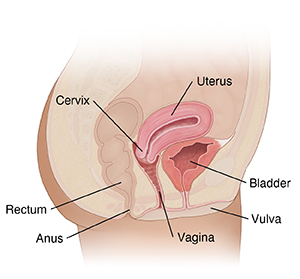Teens: STI Symptoms (Female)
STI stands for sexually transmitted infection. This means, the infection is spread during sexual activity. Viral causes of STIs include hepatitis B, herpes, HIV, and human papillomavirus (HPV). Bacterial causes include chlamydia, gonorrhea, and syphilis. STIs can infect the genitals, mouth, and anus. They can spread inside the body and harm the reproductive organs, which may cause a person to be sterile. Sterile means you can’t be a biological parent.
In girls and women, signs of STIs can sometimes be hard to notice. Pay attention to your body. Learn what’s normal for you, and have any symptoms checked out. STIs can only be prevented by not having sex (abstinence). Proper use of condoms (male or female) can help prevent STIs, but does not fully protect against infections.
Female genitals


What are the symptoms of STIs?
For women, symptoms of an STI can be inside or outside the body, or both. Common symptoms may include:
-
Discharge (fluid) from the vagina or rectum (some vaginal discharge is normal, but discharge caused by STIs may be heavy, have a strong odor, and cause pain or discomfort)
-
Burning or pain when you pee
-
Sores, warts, or blisters in or around the mouth, vagina, labia, or rectum
-
Sore throat after oral sex
-
Pain in or around the anus or buttocks after anal sex or other anal or buttocks contact during sex
-
Lumps or bumps on the genitals
-
Itching on or around the genitals or anus
-
Pain in the pelvis, lower belly, or rectum
-
Rash or other changes on the skin under your feet and on the palms of your hands
-
Enlarged glands, body aches, and fever
-
Fatigue
-
Night sweats
-
Weight loss
What you can do
Keep in mind: You may not have any symptoms. So, get checked (screened) if you’re at risk for STIs. Talk to your healthcare provider, school nurse, campus clinic, or local health department for help.
Talk with your partner(s) about STIs and testing. If you have an STI, you will need to encourage your partner(s) to be treated. Otherwise, they can pass the infection back to you, or on to others. But it’s important you feel it’s safe to have this talk. If you’re afraid of how your partner may react when you talk about testing, don’t talk face-to-face. Instead, send a text, email, or call. Ask for help before you do this if you feel you’re not safe and your partner might hurt you.